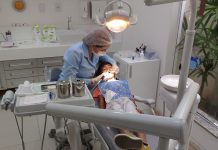 September is Ovarian Cancer Awareness Month, and Birmingham Mom Collective is thankful to have Dr. Teresa K.L. Boitano of UAB Medicine’s Gynecologic Oncology Department with us today to tell us more about this important topic.
September is Ovarian Cancer Awareness Month, and Birmingham Mom Collective is thankful to have Dr. Teresa K.L. Boitano of UAB Medicine’s Gynecologic Oncology Department with us today to tell us more about this important topic. Dr. Boitano is a female cancer surgeon who specifically treats uterine, ovarian, cervical, and vulvar cancers. Her research focuses on cervical cancer prevention, quality improvement in surgical outcomes, improving quality of life in chemotherapy patients, and surgical education. In other words, she’s an expert on the subject.
As much as we don’t want to think about female cancers, knowledge is power. Knowing your risk factors and symptoms can protect you!
Four Main Types of Gynecologic Cancers
There are four main types of gynecologic cancers:
-
- ovarian cancer
- uterine (endometrial) cancer
- cervical cancer
- vulvar/vaginal cancer
Uterine cancer is the most common gynecologic cancer in the United States, followed by ovarian cancer. In general, the occurrence of these cancers varies and certain risk factors including lifestyle, genetics, and HPV infection (for cervical cancer) can increase the likelihood of developing these cancers.
The estimated risk of uterine cancer in the general population is 1 in 36 women. And the risk for ovarian cancer is 1 in 78 women.
Who is at Risk?
The risk factors vary depending on each cancer type.
- For cervical cancer, risk factors include HPV infection, smoking, and having a weak immune system. Cervical cancer can be prevented through the HPV vaccine and screening with the Pap test. It is recommended that all boys and girls get the HPV vaccine around ages 9-11 (but individuals can get vaccinated up to age 45). It’s crucial women seek regular care with a gynecologist or primary care physician for routine screening with the Pap test.
- For ovarian cancer, risk factors include a family history of ovarian cancer, genetic mutations (such as BRCA 1 or 2), and increasing age.
- Uterine cancer risk factors include obesity, diabetes, and high levels of estrogen without progesterone (unbalanced female hormones).
- Vulvar and vaginal cancer risk factors are similar to cervical cancer and include HPV infection, smoking, and chronic skin conditions affecting the vulva.
Notable Symptoms
Dr. Boitano always tells women they know their body better than anyone else. If something seems off, seek out medical advice.
If someone has abnormal bleeding (longer periods than normal, heavier than normal, bleeding in-between normal periods, bleeding after intercourse, or bleeding after menopause, etc.), seek help. It is important to get a medical evaluation with a gynecologist or primary care physician as soon as possible.
Here are other symptoms to look out for:
- Ovarian cancer: abdominal/pelvic pain or discomfort, bloating, changes in bowel habits, unexplained weight loss, and fatigue. When these symptoms are persistent or getting worse, women should seek out a medical evaluation.
- Uterine cancer: abnormal bleeding described above, unexplained weight loss, and abdominal or pelvic pain.
- Cervical cancer: abnormal vaginal bleeding between periods, after intercourse, or after menopause. Cervical cancer is preventable with appropriate screening, so it is very important for women to see their physician for routine screening.
- Vulvar/Vaginal cancer: itching, burning, or pain in the vulvar area, skin changes, abnormal bleeding, or abnormal lumps.
Dr. Boitano knows reading these symptoms can be scary since a lot of women experience these issues from time to time. The most important thing is for women to pay attention to their bodies and changes they might be experiencing. If anything seems concerning, have a conversation with your doctor or healthcare provider.
UAB Medicine’s Comprehensive Ovarian Cancer Program and Genetics Clinic
 UAB Medicine’s O’Neal Comprehensive Cancer Center is an NCI-designated center. This means it has reached the top standards in the country for cancer prevention, clinical services, and research. UAB Medicine is one of 51 NCI-designated cancer centers in the United States, which allows patients to have access to novel treatments and cutting-edge trials.
UAB Medicine’s O’Neal Comprehensive Cancer Center is an NCI-designated center. This means it has reached the top standards in the country for cancer prevention, clinical services, and research. UAB Medicine is one of 51 NCI-designated cancer centers in the United States, which allows patients to have access to novel treatments and cutting-edge trials.
Dr. Boitano, along with other doctors at UAB Medicine, gives patients the best up-front, data-driven therapy with the best known outcomes.
UAB Medicine also has a genetics clinic that’s great for patients and their family members. Since some gynecologic cancers can be genetically related, they screen and offer recommendations for preventative measures, treatment options, and if family members should be screened.
Women with concerning family histories of gynecologic cancer can be referred to the genetics clinic for screening.
Previvor Genetic Screening
Genetic screening helps detect abnormalities that puts patients at risk for cancer.
Who Should Be Screened:
- Those with a personal or family history of hereditary conditions, for example:
-
- if a close relative has a BRCA 1 or 2 mutation
- if there is a strong family history of colorectal cancer (can be associated with hereditary non-polyposis colorectal cancer or Lynch Syndrome)
- if family members have a history of breast or ovarian cancer especially below 50 years old
- Those with a personal history of cancer- If a woman is diagnosed with a gynecologic cancer at a young age, there could be a genetic component.
- Please note that these are general recommendations and not a comprehensive list.
The Genetic Counseling Appointment
Women with concerning history are referred to genetic counseling. At this appointment, they will undergo:
- a family and personal history risk assessment (looking at types of cancers in close family members)
- ancestral background (certain genetic mutations are more common in some ethnic or racial groups)
- counseling about what genetic testing entails
Results are discussed with a professional genetic counselor or healthcare provider. If a patient does have an increased risk for certain conditions, preventative measures are then discussed.
Speak Up!
It is so important for women to speak up if they think something is not normal. Even though we as women are often busy taking care of families and working hard, self-care is vital. Take time to get appropriate medical evaluations and screenings to stay healthy.
Women who come to UAB Medicine get comprehensive and compassionate care thanks to their team approach. Dr. Boitano and her colleagues work with patients to come up with the best treatment plan for their individual situation. They perform surgeries, give chemotherapy, work with the radiation oncology team, and follow patients regularly for visits.
The team of physicians, nurse practitioners, nurses, healthcare techs, patient navigators, social workers, and front desk staff are vital to this group working so well. Women and their families get all the care they need at one convenient location, and Birmingham is very fortunate to have expert medical care right here in our city.
Call 205.934.9999 (toll-free 1.800.822.8816) to make an appointment or request an appointment online today!












